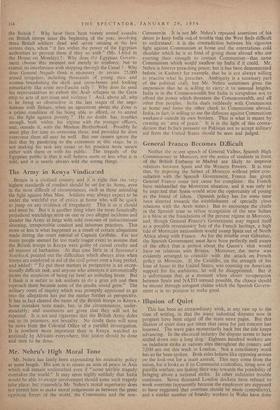The Army in Kenya Vindicated
Britain is a civilised country and it is right that the very highest standards of conduct should be set for its Army, even in the most difficult of circumstances, such as those attending the fight against Mau Mau. Soldiers may always expect to be under the watchful eye of critics at home who will be quick to jump on any evidence of irregularity. This is as it should and must be. But it is another thing when the more fanatically prejudiced watchdogs seize on one or two alleged incidents and slander the Army at large with wild rumours of indiscriminate shooting, irresponsible conduct and inhuman practices, This more or less is what happened as a result of certain allegations made during the court martial of Captain Griffiths. Far too many people seemed far too ready (eager even) to assume that the British troops in Kenya were guilty of casual cruelty and all manner of barbarism. At that time Strix in A Spectator's Notebook pointed out the difficulties which always arise when troops are employed in aid of the civil power over a long period, and added: " To put these matters in perspective is an excep- tionally difficult task, and anyone who attempts it automatically incurs the suspicion of being (at best) an unfeeling brute. But I think it is unfair to ask soldiers to do a grim job and then reproach them because some of the results sound grim." The military court of inquiry which was promptly appointed to go into the allegations has put the matter further in perspective. it has in fact cleared the name of the British troops in Kenya. Some mistakes were made, but, in the circumstances, under- standably; and assurances are given that they will not be repeated. It is. tea and cigarettes that the British Army doles out to its prisoners, not brutality. No doubt there will soon be news from the Colonial Office of a parallel investigation. It is nowhere more important than in Kenya, watched so anxiously by Africans everywhere, that justice should be done and seen to be done.


















































 Previous page
Previous page